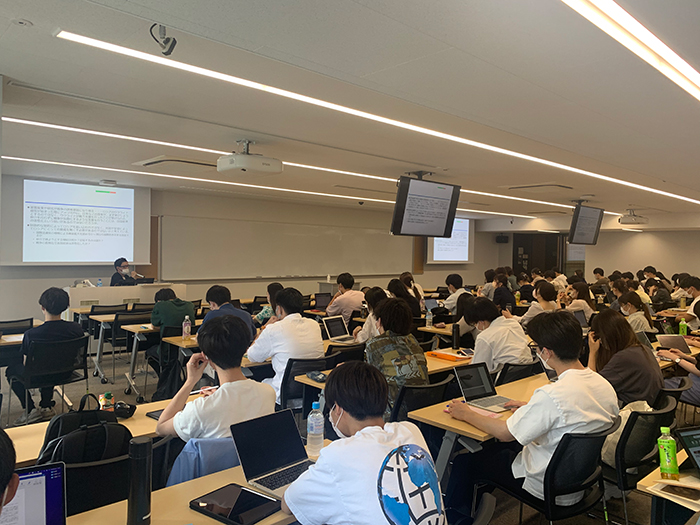Class Introduction:Course Introduction: International Security Studies 1
Comment from Professor:
I believe that we are seeing the term “security” more frequently in daily life. In international politics, it is not easy to simultaneously ensure the security and interests of one’s own country, respect the values pursued by other countries, and maintain peace and stability in the international community as a whole. On the other hand, there are cases where the possibility of war has significantly decreased between countries that were once adversaries, like Japan and the US or Europe, or places where there was conflict but it did not escalate into war, or where there have been advancements in disarmament efforts, even if only partially. Why do such phenomena occur? In “International Security Studies 1” we learn the basic concepts for understanding this mechanism by engaging with theories and historical case studies that have been built up in the field of international political science/security studies.
This course emphasizes “thinking and expressing oneself academically” about security issues. Arguments such as there should not be war, nuclear weapons should be abolished, defense spending should be increased, and alliances should be strengthened, are frequently discussed. These are, of course, important real world issues, but I want students to first develop the ability to judge these arguments based on reasoning and evidence rather than preconceptions or beliefs. In “International Security Studies 2”, starting from a similar awareness of issues, we will also consider more specific policy challenges focusing on Japan's security policy and cases concerning Japan-US relations.

Class Interview
In this course, we think about what security is by learning about the theories, mechanisms, and history of international politics. When you hear security, you may feel it has a strong military connotation, but recently its scope has expanded to include cyber, economic, and energy security, and this course deepens our understanding of these areas as well.
Thanks to a mandatory class in my first year, I became interested in international political science and, among other things, was most interested in the China-US relationship which has a significant impact on the recent international order. Not limited to these two countries, in recent international relations, everything, including economics and technology, is being valued as part of security; I took this course to deepen my understanding of such issues.
After every class, we submit a reaction paper, and the answers are addressed in the next lecture. Since stimulating student opinions are also shared, we can participate in the class more enthusiastically. Furthermore, emerging technologies are becoming frequently discussed as potential disruptors of security, so since this is the professor's research area, we can gain a deep understanding of these issues.
In today's globalized world, interacting with other countries is inevitable, and I believe
that security will continue to be a crucial issue in this context. With all this in mind, I want to engage in work or trade that connects Japan with other countries as my career, so by deepening my knowledge about security and international relations, I hope to contribute to society in the future.
(Moe Fujiyama, Third-year, Faculty of Global Studies)
Regarding international security, the focus is on how to maintain and stabilize the current balance of power between nations through each country's security policies taking into account political theories and ideologies. Additionally, we study concrete topics such as the principles of arms race and deterrence, and arms export which are the foundational concepts in security studies.
Specifically, I became interested in learning about how security policies at state level can address and counter the non-rational state approaches by non-governmental actors like terrorist organizations, such as ISIL. Moreover, I decided to take this course as the onset of the Ukraine invasion by Russia occurred during the course registration period and the failure of “deterrence” there had a significant impact on me.
The content is undeniably interesting, with many fantasy-like real-world topics in the security field, such as cyber-attacks and space security, which have been talk of the day in recent years. The fact that security can be related to various phenomena and connected to my fields of interest is highly appealing.
Since I belong to Professor Saito's seminar, I aim to connect my graduate thesis with non-governmental actors in the security sector by acquiring basic knowledge of security studies.
(Third-year, Faculty of Global Studies)
